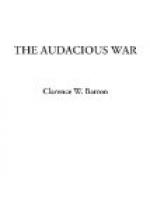It is declared that the people of Europe have wanted this war; that the Germans wanted to expand by war; that the French have wanted to fight for Alsace-Lorraine; that the Russians must war for a water outlet; that the English have favored war for a readjustment of the European balances in power. There are many individuals who want their neighbors’ goods, or redivision; there are many cities jealous of their commercial rivals; there are many states jealous of the progress of others; but all these no longer think of war as a method of readjustment, or even of redress of grievances.
Patriotism and nationality should no more be a basis of war than civic pride or family pride.
Perhaps the first error to be blotted out before a universal peace is that which arises from the German teaching that the state is a distinct entity or individuality apart from ourselves; that a state has no moral status, no moral principles, and can do no wrong; that while we may not steal individually, we will justify ourselves in stealing, murdering, and plundering collectively, in the name of the state.
When once this error is clearly seen and rooted out, we shall still find in every community men who believe that what a man is able to get and hold is his by right of possession and power; and we shall still have police regulations, departments of justice, and courts of law, to defend the weak against injustice from the strong.
We have constitutions in civilized communities to prevent robbery and the injustice of majorities upon minorities. We have sheriffs, police, and military power to enforce the edict of right, when once the highest tribunal has made the nearest possible human approach to justice.
A distinguished lawyer once said to me that, to him, the most wonderful thing in the world was an edict of the Supreme Court of the United States; “A few words scrawled upon a scrap of paper and approved by some aged individuals of no great physical vigor; and, behold, it is instantly the law of a hundred million people!”
And, for the benefit of future human progress, the argument supporting that edict is later printed with it; and that in future any errors therein may be corrected, the wisdom of the minority or dissenting judges is as carefully preserved and bound up with the major opinion and edict, that all public sources for correction of error may be preserved in the clear amber of legal justice in truth as betwixt man and man.
“For what avail the plow or sail,
Or land or life, if freedom fail?”
And freedom fails when justice falls and right of might succeeds.
The breaking up of the world’s physical body, or of the material dwellings and possessions of humanity, may be necessary for “a new birth of freedom”; for the incoming of the larger light; for a broader, more universal brotherhood.
Individual robbery or wrong may beget individual hate, but law in social organization prevents its full expression. The extent to which individual hate may be expanded indefinitely where guns take the place of law, may be illustrated by some communities in sparsely settled mountainous countries in our Southern states. Here family feuds and individual murder went on through generations, until nobody could tell how or why they ever began.




